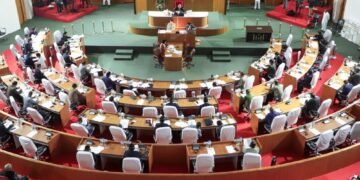Cash strapped Meghalaya has time till February 15, 2021 to complete citizen centric reforms in various sectors in order to be eligible for reform linked benefits from the central government.
The Government of India has identified four critical areas for reforms by the states. They include implementation of One Nation One Ration Card System, Ease of Doing Business reform, urban local body reforms and power sector reforms. These were communicated to the states including Meghalaya on May 17 this year.
Meghalaya is yet to complete the process for One Nation One Ration Card System.
The State also fared poorly in Ease of Doing Business. In the 2019 rankings, released by the Department for Promotion of Industry and Internal Trade (DPIIT), Meghalaya ranks 32 in Ease of Doing Business. The State is also yet to complete urban local body reforms and power sector reforms.
States successfully completing the reforms are eligible to get two benefits. Such states get the facility of additional borrowing equivalent to 0.25 per cent of their Gross States Domestic Product (GSDP) for completing each reform. Under this facility, additional borrowings of upto Rs 2.14 lakh crore is available to the states on completion of all the four reforms.
In view of the resource requirement to meet the challenges posed by the Covid-19 pandemic, the Government of India had decided in May this year to raise the borrowing limit of the states by 2 percent of their GSDP. This was aimed at enabling the states to mobilise additional financial resources of up to Rs 4.27 lakh crore. Half of this special dispensation was linked to reforms. The purpose was to motivate the states to carry out reforms in various citizen centric areas.
The second benefit available to the states completing three out of the four reforms is additional funds assistance under the “Scheme for Financial Assistance to States for Capital Expenditure”. Under the scheme, an amount of Rs 2,000 crore is earmarked for the states that will complete at least three out of the four stipulated reforms.
The scheme was announced by the Finance Minister on October 12 as part of Aatma Nirbhar Bharat Package 2.0. It is aimed at boosting capital expenditure by state governments who are facing difficult financial environment this year due to the shortfall in tax revenue arising from the Covid-19 pandemic.
A total amount of Rs12,000 crore has been earmarked by the Government of India under this scheme. Capital expenditure has a higher multiplier effect, enhancing the future productive capacity of the economy, and results in a higher rate of economy growth.
The twin incentives have pushed the states to undertake the reforms. So far nine states have implemented the One Nation One Ration Card System. They are Andhra Pradesh, Goa, Gujarat, Haryana, Karnataka, Kerala, Telangana, Tripura and Uttar Pradesh.
Five states have completed the stipulated reforms in the Ease of Doing Business. They are Andhra Pradesh, Karnataka, Madhya Pradesh, Tamil Nadu and Telangana. The Ease of Doing Business is an important indicator of the investment-friendly business climate in the state. Improvements in the ease of doing business will enable faster future growth of the state economy.
Therefore, the Government of India has decided to link grant of additional borrowing permissions to states that undertake the reforms to facilitate ease of doing business.
Additional borrowing permission of Rs 40,251 crore has been granted to the states that complete these reforms. The Centre’s decision to extend the date for completion of reforms is likely to motivate Meghalaya and other states to complete the reform process expediously and avail the linked financial benefits.
























